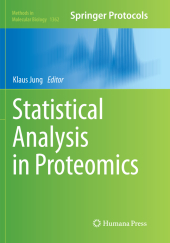 Neuerscheinungen 2019Stand: 2020-02-01 |
Schnellsuche
ISBN/Stichwort/Autor
|
Herderstraße 10
10625 Berlin
Tel.: 030 315 714 16
Fax 030 315 714 14
info@buchspektrum.de |

Klaus Jung
Statistical Analysis in Proteomics
Herausgegeben von Jung, Klaus
Softcover reprint of the original 1st ed. 2016. 2019. x, 313 S. 27 SW-Abb., 58 Farbabb., 19 Tabellen. 2
Verlag/Jahr: SPRINGER, BERLIN; SPRINGER NEW YORK; HUMANA PRESS 2019
ISBN: 1-493-97987-6 (1493979876)
Neue ISBN: 978-1-493-97987-5 (9781493979875)
Preis und Lieferzeit: Bitte klicken
This valuable collection aims to provide a collection of frequently used statistical methods in the field of proteomics. Although there is a large overlap between statistical methods for the different ´omics´ fields, methods for analyzing data from proteomics experiments need their own specific adaptations. To satisfy that need, Statistical Analysis in Proteomics focuses on the planning of proteomics experiments, the preprocessing and analysis of the data, the integration of proteomics data with other high-throughput data, as well as some special topics. Written for the highly successful Methods in Molecular Biology series, the chapters contain the kind of detail and expert implementation advice that makes for a smooth transition to the laboratory.
Practical and authoritative, Statistical Analysis in Proteomics serves as an ideal reference for statisticians involved in the planning and analysis of proteomics experiments, beginners as well as advanced researchers, and also for biologists, biochemists, and medical researchers who want to learn more about the statistical opportunities in the analysis of proteomics data.
Part I: Proteomics, Study Design, and Data Processing
1. Introduction to Proteomics Technologies
Christof Lenz and Hassan Dihazi
2. Topics in Study Design and Analysis for Multi-Stage Clinical Proteomics Studies
Irene Sui Lan Zeng
3. Preprocessing and Analysis of LC-MS-Based Proteomic Data
Tsung-Heng Tsai, Minkun Wang, and Habtom W. Ressom
4. Normalization of Reverse Phase Protein Microarray Data: Choosing the Best Normalization Analyte
Antonella Chiechi
5. Outlier Detection for Mass Spectrometric Data
HyungJun Cho and Soo-Heang Eo
Part II: Group Comparisons
6. Visualization and Differential Analysis of Protein Expression Data Using R
Tomé S. Silva and Nadège Richard
7. False Discovery Rate Estimation in Proteomics
Suruchi Aggarwal and Amit Kumar Yadav
8. A Nonparametric Bayesian Model for Nested Clustering
Juhee Lee, Peter Müller, Yitan Zhu, and Yuan Ji
9. Set-Based Test Procedures for the Functional Analysis of Protein Lists from Differential Analysis
Jochen Kruppa and Klaus Jung
Part III: Classification Methods
10. Classification of Samples with Order Restricted Discriminant Rules
David Conde, Miguel A. Fernández, Bonifacio Salvador, and Cristina Rueda
11. Application of Discriminant Analysis and Cross Validation on Proteomics Data
Julia Kuligowski, David Pérez-Guaita, and Guillermo Quintás
12. Protein Sequence Analysis by Proximities
Frank-Michael Schleif
Part IV: Data Integration
13. Statistical Method for Integrative Platform Analysis: Application to Integration of Proteomic and Microarray Data
Xin Gao
14. Data Fusion in Metabolomics and Proteomics for Biomarkers Discovery
Lionel Blanchet and Agnieszka Smolinska
Part V: Special Topics
15. Reconstruction of Protein Networks Using Reverse Phase Protein Array Data
Silvia von der Heyde, Johanna Sonntag, Frank Kramer, Christian Bender, Ulrike Korf, and Tim Beißbarth
16. Detection of Unknown Amino Acid Substitutions Using Error-Tolerant Database Search
Sven H. Giese, Franziska Zickmann, and Bernhard Y. Renard
17. Data Analysis Strategies for Protein Modification Identification
Yan Fu
18. Dissecting the iTRAQ Data Analysis
Suruchi Aggarwal and Amit Kumar Yadav
19. Statistical Aspects in Proteomic Biomarker Discovery
Klaus Jung


